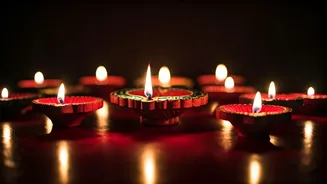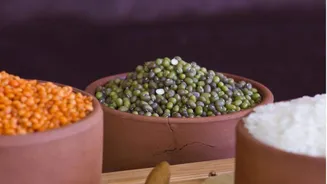Diwali's Historical Roots
The festival of Diwali, deeply rooted in Indian culture, is celebrated for different reasons across various regions, often linked to distinct historical
and mythological narratives. Primarily, it commemorates the return of Lord Rama, along with Sita and Lakshmana, to Ayodhya after a 14-year exile, following the defeat of Ravana. The people of Ayodhya illuminated the path with lamps, symbolizing the triumph of good over evil. In South India, the festival also honors the victory of Lord Krishna over the demon Narakasura. This victory is associated with the release of numerous imprisoned women from Narakasura's captivity, with the celebration taking place a day earlier, known as Naraka Chaturdasi. Furthermore, Diwali is connected with the worship of Lakshmi, the goddess of wealth and prosperity, and the beginning of the New Year for many communities. This amalgamation of stories, beliefs, and practices showcases the rich heritage and significance of Diwali in India.
Diwali 2025: The Date
Diwali typically falls on the fifteenth day of Kartika, the holiest month of the Hindu lunar calendar. The exact date changes each year based on the lunar cycle, usually occurring in late October or early November. For 2025, Diwali celebrations are expected to take place either on October 20 or October 21. This ambiguity stems from the lunar calendar and the different time zones, which means the most accurate date is best determined by local calendars or astrological calculations closer to the date. Planning for Diwali involves determining the perfect time for various rituals and celebrations, ensuring that the festive activities are observed on the correct dates. The anticipation of Diwali 2025 builds as the date draws near, creating a sense of excitement and preparation.
Rituals and Traditions
Diwali is a period filled with significant rituals and traditions, all aimed at welcoming prosperity, happiness, and good fortune. Homes are meticulously cleaned and decorated with vibrant lights, diyas, and colorful rangoli designs to invite the goddess Lakshmi into the house. The lighting of diyas symbolizes the dispelling of darkness and ignorance, allowing light and knowledge to prevail. Families gather for Lakshmi Puja, seeking the goddess's blessings for wealth and well-being. The exchange of gifts, sweets, and festive meals is a central practice, as Diwali is a time for sharing and strengthening bonds among family and friends. Furthermore, bursting firecrackers, although a fun tradition, is often practiced, though now being discouraged by environmental concerns. These traditions, passed down through generations, make Diwali a vibrant and deeply spiritual festival that celebrates the triumph of light over darkness.
Gold Prices During Diwali
Gold prices often experience notable fluctuations during the Diwali period, influenced by several factors. Diwali is considered an auspicious time to purchase gold, driving up demand and consequently impacting its price. Consumers traditionally see gold as a symbol of wealth, prosperity, and a valuable investment. The increased demand from consumers, combined with international market dynamics and currency exchange rates, can influence local gold prices. Investors closely monitor the gold market before and during Diwali. Economic indicators, such as inflation rates, currency values, and global market trends, play a key role in shaping the outlook for gold prices. The trend observed in the past few years suggests gold prices tend to rise, but these can be subject to market unpredictability.
Diwali Greetings and Wishes
Diwali is a time for spreading joy and goodwill, where people exchange wishes and greetings to share the festive spirit. Common greetings often include wishes for wealth, health, and happiness for the recipient and their family. The messages often extend well wishes for success in all endeavors. Many people send Diwali cards or messages to loved ones near and far. These greetings, whether they are digital or handwritten, create a sense of unity and connectedness. They also reflect the spirit of Diwali, emphasizing the importance of family, friendship, and the joy of sharing the festival with others. Diwali greetings serve as a way of expressing affection and celebrating the joy of the season, deepening the bonds among people.
How to Celebrate Diwali
Celebrating Diwali offers several ways to participate in the festivities. Families typically prepare traditional dishes, decorate their homes with colorful rangoli patterns and lights, and organize family gatherings to exchange gifts and share meals. The Lakshmi Puja is a key event where people seek blessings for prosperity, involving prayers, offerings, and the lighting of diyas and candles. Visiting temples to perform special prayers and participating in community events is also a common practice. Many people also take the opportunity to wear new clothes, shop for gifts, and give to those in need. Furthermore, one can enjoy watching fireworks and share the Diwali spirit with friends, families, and communities. Diwali’s wide range of activities makes it an inclusive celebration for everyone to enjoy and participate in.














